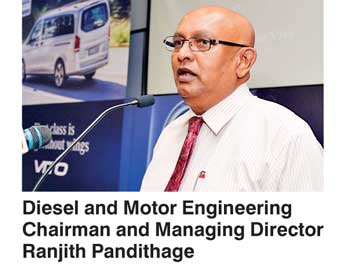Monday Feb 16, 2026
Monday Feb 16, 2026
Tuesday, 22 August 2017 00:11 - - {{hitsCtrl.values.hits}}
 Diesel and Motor Engineering (DIMO) Chairman Ranjith Pandithage yesterday hailed the Finance Ministry’s decision last week to reduce tax on small trucks saying the new move is positive for the public, especially entrepreneurs.
Diesel and Motor Engineering (DIMO) Chairman Ranjith Pandithage yesterday hailed the Finance Ministry’s decision last week to reduce tax on small trucks saying the new move is positive for the public, especially entrepreneurs.
“We appreciate the recent decision to reduce tax on smaller trucks by Finance Minister Mangala Samaraweera, which will positively affect the common man, especially the rural entrepreneur,” Pandithage said in a statement. He further mentioned: “These small trucks have revolutionised the way people carry goods across the country and have given rise to various different applications, giving impetus to entrepreneurs. Transportation costs were reduced and monopolies were broken with the introduction of these reliable small trucks, giving a boost to the SME sector.
Price plays a crucial role in the operational cost of these small trucks, and the Chairman said he feels that the price is “still on a high side.” Affordability is still out of reach from the low and middle income category which includes farmers and traders and sole proprietors who use smaller trucks, such as the DIMO Batta for daily transportation activities from their homes to towns, he said.
The DIMO Batta revolutionised the transport industry in Sri Lanka. An affordable vehicle with unparalleled fuel efficiency, with easy access to parts and repairs allowed individuals to think out of the box and develop multiple applications such as mobile salons, mobile textile shops, mobile poultry and vegetable outlets, mobile bookshops, etc.
This product became so established and successful that a generic name called ‘Batta’ was used for all similar trucks thereafter, the statement added.
“Hence whilst we appreciate the minister for his efforts, we firmly believe further reduction in smaller trucks, ‘Batta’ trucks, will enable the SME sector to grow further and also enhance development of business at the rural level. Such a move will benefit the masses and society.”
When looking at an overall positive approach, the current LTV (Loan to value ratio) which is 30% also needs reconsideration. This was earlier set at 10% and that period saw a growth spurt in the SME sector, especially in rural areas. To the rural entrepreneur and farmer the jump from 10% to 30% is quite difficult to bridge, the Chairman said.
“Whilst appreciating the Rs. 300,000 reduction, it is also important to remember that an increase of Rs. 700,000 still exists. Along with the suggestions made above, this too can be brought down to a level that encourages the common man to buy a small truck and challenge himself to become an entrepreneur.
“I believe these few changes will definitely inject life and entrepreneurship into the rural sector of Sri Lanka. This is where the growth of our economy should start from.”